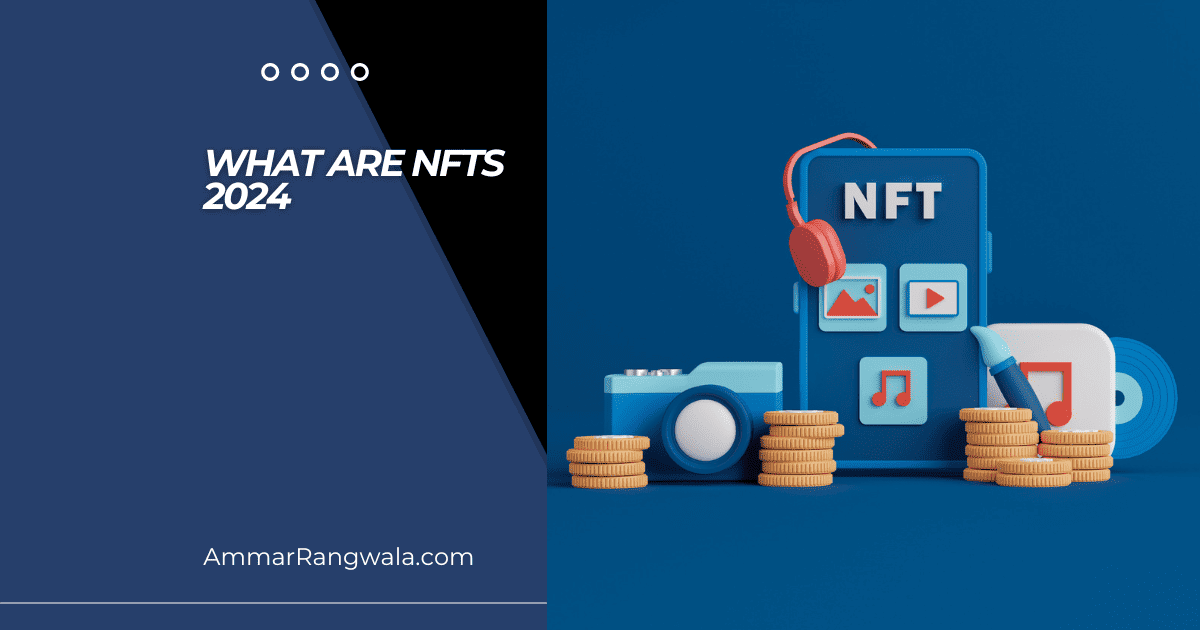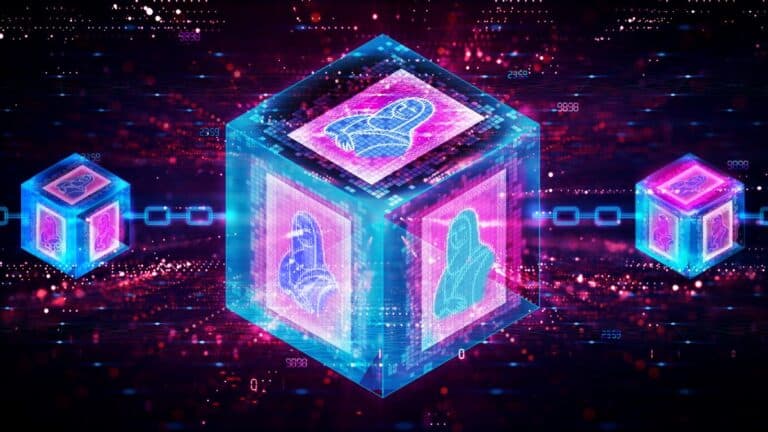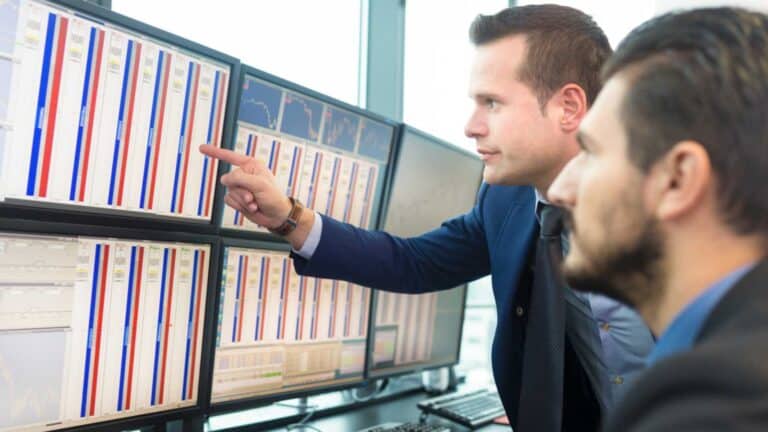What are NFTs 2024

What are NFTs? The digital landscape is abuzz with a new phenomenon – NFTs, or Non Fungible Tokens. These digital assets have exploded in popularity, capturing headlines and sparking curiosity worldwide.
Beyond the Hype
While NFTs have generated significant excitement, it’s crucial to understand their potential beyond a passing trend. They can transform various industries, including art, music, gaming, and collectibles.
Demystifying the Basics
At their core, NFTs are unique digital certificates of ownership registered on a blockchain. Unlike fungible tokens like Bitcoin (where each unit is identical), each NFT is one-of-a-kind and cannot be replicated. This unique characteristic empowers them to represent digital scarcity and verifiable ownership of various digital and real-world assets.
Blockchain: The Secure Foundation
Imagine a secure, public ledger recording every transaction—that’s the essence of blockchain technology. This technology underpins NFTs, providing a transparent and tamper-proof record of ownership and adding a layer of trust and security to the digital realm.
Diving Deeper into NFTs
Unveiling the NFT Landscape
NFTs encompass diverse digital assets, each offering unique functionalities and experiences. Here’s a glimpse into some prevalent categories:
- Digital Artwork: This is where NFTs gained widespread recognition. Artwork, including paintings, photographs, and even 3D creations, can be tokenized as NFTs, allowing ownership verification and fostering a new era of digital art collecting.
- Music: The music industry is embracing NFTs, allowing artists to release exclusive tracks or album experiences as NFTs. This empowers musicians to connect directly with fans and receive royalties through secondary sales.
- Collectibles: With NFTs, the realm of collectibles extends beyond traditional physical objects. Digital trading cards, sports memorabilia, and even virtual fashion items are finding a new life on the blockchain, catering to collectors seeking unique digital assets.
- In-game Items: NFT gaming allows players to own unique in-game items like weapons, skins, or avatars. These NFTs can hold value within the game itself and potentially be traded or sold outside the game’s ecosystem.
- Real-world Assets: NFTs’ potential extends beyond the digital realm. Real-world assets like property, luxury goods, or even fractional ownership of physical objects can be represented by NFTs, potentially streamlining ownership transfer and verification processes.
Minting the Future: Creating Your First NFT
Creating an NFT, known as “minting,” involves converting a digital asset into a unique token on a blockchain platform. Here’s a simplified breakdown:
- Choose a Platform: Several online platforms, such as OpenSea, Rarible, and Mintable, facilitate NFT creation. Each platform has its functionalities and fees associated with minting.
- Prepare your Asset: Ensure your digital asset is in a compatible format and meets the platform’s specific requirements.
- Pay the minting fee: Minting typically incurs a fee, often paid using cryptocurrency, which covers the network’s transaction cost. An example of this type of network is the Ethereum blockchain.
- List and Sell (Optional): Once minted, your NFT can be listed for sale on the chosen platform or other compatible marketplaces.
Navigating the NFT Marketplace: Buying, Selling, and Fees
The NFT buying and selling world operates through dedicated marketplaces and auction platforms. Here’s a breakdown of the critical aspects:
- Marketplaces: Popular NFT marketplaces like OpenSea, Rarible, and SuperRare allow users to browse, purchase, and sell NFTs across various categories.
- Auction Platforms: Some platforms facilitate auctions for high-value or unique NFTs, allowing buyers to compete for ownership through bidding processes.
- Understanding Fees: When buying and selling NFTs, be mindful of associated fees. These include platform fees, transaction fees on the underlying blockchain, and potentially creator royalties on secondary sales.
Securing Your Digital Treasures: NFT Storage and Security
Owning NFTs necessitates secure storage solutions. Here’s what you need to know:
- Digital Wallets: NFTs are stored in digital wallets that use cryptography to manage and secure your private keys. Popular options include MetaMask, Coinbase Wallet, and Trust Wallet.
- Choosing a Secure Crypto Wallet: Opt for reputable and secure wallets with features like multi-factor authentication and strong password management practices.
- Self-Custody vs. Custodial Wallets: Understand the difference between self-custody wallets (where you hold your private keys) and custodial wallets (where a platform manages your keys). Each carries its own set of risks and benefits.
The Evolving Landscape of NFTs
The potential applications of NFTs extend far beyond the current hype. Here’s a glimpse into the future:
- Revolutionizing Intellectual Property Rights: NFTs could offer a more secure and transparent way to manage ownership rights for digital creations like music, art, and software.
- Shaping the Future of Digital Identity: NFTs could help establish secure and verifiable digital identities, allowing individuals to control their personal data and online interactions.
- Building the Metaverse: NFTs are potential building blocks for the metaverse, a virtual world where users can interact and own digital assets. They could represent ownership of virtual real estate, avatars, and other elements within the metaverse. An example of this is Axie Infinity.
Understanding the Value of NFTs
While headlines often focus on the astronomical prices some NFTs fetch, their value extends beyond the purely monetary. Exploring the concept of intrinsic value in the context of NFTs reveals additional factors that contribute to their appeal and worth.
Beyond the Dollar Sign
- Artistic Merit: Like traditional art, certain NFTs hold value based on their creativity, originality, and creative expression. Collectors may value an NFT for its aesthetic qualities, historical significance within the digital art movement, or message.
- Historical Significance: Similar to physical historical artifacts, unique NFTs tied to iconic moments, events, or cultural milestones can hold significant value for collectors and enthusiasts. Owning a piece of digital history can be a compelling proposition for some.
- Community Connection: NFTs often act as membership tokens or access passes to exclusive online communities, events, or experiences. This sense of belonging and shared interest can contribute to the perceived value of an NFT, especially within specific communities.
Market Forces at Play
Several factors influence the market value of an NFT, creating a complex and dynamic landscape.
- Creator Reputation: Established artists, musicians, or other prominent figures with dedicated fanbases can command higher prices for their NFTs due to their established reputation and brand recognition.
- Underlying Asset Value (if applicable): Some NFTs represent ownership of real-world assets like digital versions of trading cards or even physical artwork. The value of the underlying asset can directly impact the NFT’s value.
- Market Demand: Ultimately, the market dictates the value of an NFT. Speculation, hype, and trends can significantly influence demand and drive prices up, although this can also lead to bubbles and volatility.
Cautionary Notes
It’s crucial to acknowledge the inherent risks associated with NFT investments.
- Market Volatility: The NFT market is still young and highly volatile. Prices can fluctuate significantly, and future value is not guaranteed.
- Speculation Bubbles: The hype surrounding certain NFTs can lead to speculative buying, inflating prices beyond their intrinsic value. These bubbles can burst, causing significant losses for investors.
- Potential Scams: Like any emerging technology, the NFT space attracts scammers. It’s important to be vigilant and conduct thorough research before investing in any project to avoid falling for any NFT scam.
Ethical Considerations:
The rise of NFTs also raises some ethical concerns that require consideration.
- Environmental Impact: The proof-of-work consensus mechanism used by some blockchains supporting NFTs raises concerns about their high energy consumption. This environmental impact is a significant consideration for environmentally conscious individuals.
- Money Laundering & Fraud: As with any valuable asset class, NFTs can be susceptible to money laundering and fraudulent activities. Implementing robust regulations and due diligence practices is crucial to mitigate these risks.
FAQ:
Do I own the Copyright of an NFT I Purchase?
Owning an NFT grants ownership of the token representing the digital asset, not necessarily the underlying work’s copyright. Usage rights and copyright ownership might reside with the original creator or be outlined in the specific NFT’s terms and conditions.
Can NFTs be easily copied or replicated?
While anyone can download a copy of the digital asset associated with an NFT, it wouldn’t be an authentic NFT itself. Each NFT has a unique identifier stored on the blockchain, making it distinguishable and verifiable from any copies.
What are the environmental concerns surrounding NFTs?
The energy consumption of blockchain technology, which underpins NFTs, has raised concerns about its environmental impact. Ongoing research and development aim to find more sustainable solutions for blockchain operations.
How do I avoid NFT scams?
Exercise caution and conduct research before investing in any NFT. Be wary of unrealistic promises, unsolicited investment offers, and platforms lacking transparency or established reputations.
Where can I learn more about NFTs?
Here are some additional resources to help you delve deeper into the world of NFTs:
- Educational Articles:
- Documentaries:
- “NFTs: A New Reality” on Netflix
- “Cryptocurrency: The Future of Money?” on PBS
- Reputable NFT Marketplaces:
- OpenSea: https://opensea.io/
- Rarible: https://rarible.com/
- Nifty Gateway https://niftygateway.com
Summary
NFTs, or Non-Fungible Tokens, have taken the digital world by storm. These unique digital assets, characterized by their non-fungibility, verifiable ownership, and scarcity, offer exciting possibilities across diverse fields like art, music, and gaming.
However, it’s crucial to remember that NFTs are not without their complexities. It is essential to understand their inherent value beyond just monetary worth, the various factors influencing their price, and the potential risks associated with speculation and market volatility. Additionally, ethical considerations surrounding energy consumption and potential misuse must be addressed.
Therefore, thorough research and a cautious approach are paramount before venturing into the NFT landscape. Consulting with financial professionals can provide valuable guidance, especially considering NFTs as investments.
Ultimately, NFTs represent a fascinating innovation with the potential to reshape various aspects of our digital world. By fostering responsible and informed participation in this evolving ecosystem, we can navigate this exciting frontier while mitigating potential pitfalls and fostering a thriving, sustainable future for NFTs.
Note: I am not a financial advisor. This should not be considered financial advise. Please do your own due diligence before proceeding.
Ammar has started several online businesses and is a blogger who loves providing quality content to help others. He is involved with affiliate marketing, domain names, NFTs, and cryptocurrencies. Check out my blog if you want to learn more about these areas and business in general.


